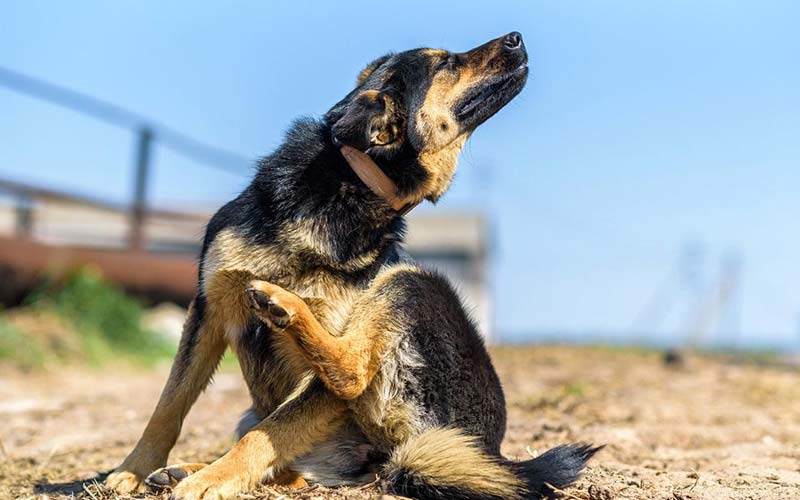Many dog owners are all too familiar with the sight of their pet incessantly scratching or licking, but when you check for fleas and find none, the cause of the discomfort becomes a mystery. While fleas are a common culprit, dogs can develop itchy skin for a wide range of reasons unrelated to parasites. From allergies to dry skin or even anxiety, several factors can lead to your dog’s discomfort.

In this article, we’ll explore the potential reasons behind your dog’s itchiness, offer practical solutions you can try at home, and help you recognize when it’s time to seek veterinary advice. Understanding the underlying causes is essential for keeping your pet healthy and comfortable, so let’s dive into the most common triggers of non-flea-related itching and how to address them effectively.
1. Common Causes of Itchiness in Dogs Without Fleas
If your dog is scratching constantly but has no fleas, several underlying causes could be at play. Identifying the root of the problem is crucial for effective treatment and long-term relief.
Allergies
Allergies are a common cause of persistent itching in dogs. They can develop due to environmental factors, food sensitivities, or contact with irritants.
- Environmental Allergies: Dogs, like humans, can suffer from seasonal or environmental allergies. Pollen, dust mites, mold, and even grass can trigger allergic reactions that manifest as itchy skin. These reactions are often more severe in areas such as the paws, face, or belly.
- Food Allergies: Certain ingredients in your dog’s diet, such as beef, dairy, chicken, or grains, can cause food sensitivities that result in itchy skin. Unlike environmental allergies, food allergies may also lead to gastrointestinal issues, such as vomiting or diarrhea, in addition to skin irritation.
- Contact Allergies: Direct contact with certain substances can also cause allergic reactions in dogs. Cleaning products, fertilizers, certain types of plants, or even specific fabrics might irritate your dog’s skin, causing redness, itching, and sometimes swelling.
Dry Skin
Dry skin is another common reason for itchiness, particularly in specific seasons or due to dietary factors.
- Weather-Related Dryness: In colder months, the dry air can cause a dog’s skin to lose moisture, leading to flaky, itchy patches. These symptoms can worsen if the home environment is heated and lacks proper humidity.
- Diet-Related Dryness: If your dog’s diet lacks sufficient omega-3 fatty acids, their skin may become dry and irritated. Omega-3s help maintain skin hydration and support a healthy coat, so a deficiency in these essential nutrients can lead to discomfort.
Skin Infections
Skin infections, whether bacterial or fungal, can result from constant scratching or open wounds.
- Bacterial Infections: If a dog has been scratching excessively, the skin can become vulnerable to bacterial infections. These infections often appear as red, inflamed areas that may discharge pus, leading to even more discomfort.
- Fungal Infections: Yeast infections are another frequent cause of itching. These typically occur in moist areas of a dog’s body, such as the ears, paws, or skin folds. Yeast infections may also produce a distinct odor, which can help in identifying the problem.
Parasites Other Than Fleas
Even if your dog is flea-free, other parasites could still be causing itchiness.
- Mites (Mange): Mites can cause a condition known as mange, leading to intense itching, hair loss, and irritated skin. Sarcoptic mange, caused by the Sarcoptes scabiei mite, is highly contagious and requires immediate treatment.
- Ticks and Lice: Though less common, ticks and lice can also infest a dog’s coat, causing skin irritation. These parasites are typically visible to the naked eye, but their presence can lead to considerable discomfort if not treated.
Hot Spots
Hot spots are localized areas of inflamed and infected skin. They often develop when a dog persistently licks or scratches an area, creating open wounds that become infected. Moisture buildup, often due to environmental conditions or excessive grooming, can also contribute to the formation of hot spots. These painful lesions require prompt treatment to prevent further infection.
Hormonal Imbalances
Hormonal issues can also lead to skin problems, including chronic itching.
- Hypothyroidism: This condition occurs when a dog’s thyroid gland produces insufficient thyroid hormone, which can result in dry, itchy skin, hair loss, and recurring infections.
- Cushing’s Disease: Cushing’s disease, caused by excessive production of cortisol, can lead to various skin issues, including thinning skin, hair loss, and itchiness.
Stress or Anxiety
Finally, behavioral issues like stress or anxiety can cause dogs to over-groom or scratch excessively. Dogs may develop this habit due to changes in their environment, boredom, or separation anxiety. Over time, the constant licking or scratching can lead to skin irritation, sores, and infections.
Understanding these potential causes is the first step toward addressing your dog’s itchiness. By recognizing the signs and symptoms, you can take action to improve your pet’s comfort and health.

2. Signs Your Dog Needs Immediate Veterinary Attention
While occasional scratching is normal for dogs, persistent itching can be a sign of a more serious underlying issue. If your dog’s condition worsens or exhibits any of the following symptoms, it’s crucial to seek veterinary care right away:
Persistent Scratching
If your dog is scratching continuously to the point of creating open sores, hair loss, or visible skin damage, this could indicate a deeper problem, such as a severe allergy, infection, or parasite infestation. Left untreated, these issues can lead to secondary infections and prolonged discomfort.
Signs of Infection
Red, inflamed, or oozing skin is a clear sign of infection. Whether it’s a bacterial or fungal infection, these conditions require prompt treatment to prevent further spread and relieve your dog’s pain. Infections can also cause the skin to become thickened or produce a foul odor.
Behavioral Changes
Increased irritability, restlessness, or withdrawal from normal activities can be signs that your dog is experiencing significant discomfort. Dogs in pain or distress may also become more aggressive or anxious, indicating the need for professional intervention.
Weight Loss or Appetite Changes
If your dog’s itching is accompanied by sudden weight loss or changes in appetite, this could suggest a larger health issue, such as a systemic infection, hormonal imbalance, or gastrointestinal problem. A comprehensive veterinary evaluation is essential in these cases to identify and address the root cause.
Acting swiftly when these symptoms arise can prevent further complications and improve your dog’s overall well-being.

3. How to Relieve Your Dog’s Itchiness at Home
If your dog’s itchiness isn’t severe or requires immediate veterinary care, there are several at-home remedies you can try to help relieve their discomfort. From dietary changes to grooming and calming techniques, these solutions can address the underlying causes of itching and promote healthier skin.
Dietary Adjustments
What your dog eats can significantly affect their skin health.
- Introduce Omega-3 Fatty Acids: Omega-3s, found in fish oil or flaxseed oil, are known for their anti-inflammatory properties and ability to improve skin moisture. Including these fatty acids in your dog’s diet can help soothe dry, itchy skin and reduce inflammation associated with allergies.
- Switch to a Limited-Ingredient Diet: If food allergies are a concern, transitioning to a limited-ingredient diet can help identify and eliminate potential allergens. By avoiding common triggers such as beef, dairy, and grains, you can better manage your dog’s skin sensitivities and reduce itching.
Regular Grooming
Routine grooming is essential for maintaining healthy skin and coat, particularly for dogs prone to allergies.
- Brushing: Regularly brushing your dog helps remove environmental allergens like pollen or dust from their coat, preventing skin irritation. Brushing also stimulates the skin, distributing natural oils that keep it moisturized.
- Hypoallergenic Shampoos: Bathing your dog with hypoallergenic shampoos can provide relief from itching. These shampoos are formulated to be gentle on sensitive skin, often containing soothing ingredients like oatmeal or aloe vera. Avoid harsh chemicals, which can exacerbate skin issues.
Moisturizing Products
Moisturizing your dog’s skin can help combat dryness and irritation.
- Coconut Oil or Aloe Vera: Applying a small amount of coconut oil or aloe vera gel to dry, irritated areas can provide natural relief. Both products are known for their soothing, anti-inflammatory properties and can help heal minor skin issues.
- Oatmeal Baths: Oatmeal has long been used as a remedy for itchy skin. An oatmeal bath can soothe inflamed areas, reduce redness, and provide calming relief for dogs with irritated skin. It’s an easy, natural solution you can try at home.
Parasite Control
Even if fleas aren’t present, other parasites like mites or ticks can cause significant itching.
- Mite and Tick Prevention: Consult your veterinarian for parasite prevention products that target mites and ticks. These products, often available in topical or oral forms, can help keep your dog parasite-free and relieve associated skin irritation.
Calming Aids for Anxiety
If your dog’s itchiness is linked to stress or anxiety, addressing the root cause can reduce excessive scratching.
- Behavioral Training: Dogs that scratch due to anxiety may benefit from behavioral training. Teaching your dog alternative behaviors or providing them with more mental and physical stimulation can reduce stress-related scratching.
- Supplements or Diffusers: Natural calming aids like pheromone diffusers or supplements can help relax anxious dogs. These products work by mimicking calming signals or providing natural herbs that promote relaxation, reducing anxiety-induced scratching.
By implementing these at-home remedies, you can provide relief to your dog while improving their skin health and overall comfort. However, if symptoms persist, a veterinary consultation is recommended to rule out more serious underlying conditions.

4. When to Seek Veterinary Help
While many cases of itchiness can be managed at home, some situations require professional attention. If your dog’s symptoms persist or worsen, it’s essential to seek veterinary help to identify the underlying cause and prevent further complications.
Chronic or Worsening Symptoms
If your dog’s itching continues despite home remedies or shows signs of getting worse—such as more frequent scratching, open sores, or increased discomfort—it’s time to consult your vet. Persistent itching can lead to infections and more serious skin conditions, making early intervention crucial.
Diagnosis of Allergies or Infections
Veterinarians can perform allergy testing or skin biopsies to determine the root cause of your dog’s symptoms. If environmental, food, or contact allergies are diagnosed, your vet may recommend treatments like antihistamines, steroids, or a specialized diet to manage the condition. In the case of skin infections, identifying whether they’re bacterial or fungal will guide the appropriate course of treatment.
Hormonal Testing
In some cases, hormonal imbalances such as hypothyroidism or Cushing’s disease may be the cause of chronic itching. Blood tests are necessary to diagnose these conditions, and treatment options vary depending on the underlying hormonal issue.
Prescription Medications
For more severe or complicated cases, prescription medications may be required. Your vet might prescribe antibiotics for bacterial infections, antifungal medications for yeast infections, or stronger treatments for persistent skin issues. These medications help target the root cause of the itching and provide relief.
Seeking timely veterinary care ensures your dog receives the correct diagnosis and treatment plan, leading to a faster recovery and improved quality of life.

5. Preventing Future Itchiness
To ensure your dog remains comfortable and itch-free, proactive measures are essential. Here are key strategies to prevent future skin issues and maintain your dog’s overall health:
Consistent Flea and Parasite Prevention
Even if fleas are not currently an issue, maintaining a comprehensive flea and parasite prevention plan is crucial. Regular use of veterinarian-recommended flea and tick preventatives helps create a barrier against these pests, reducing the risk of future infestations and associated itching.
Balanced Diet and Hydration
A well-balanced diet is fundamental for healthy skin and coat. Ensure your dog receives the appropriate nutrients, including essential fatty acids like omega-3s, which support skin moisture and reduce inflammation. Providing fresh water daily also helps maintain hydration and skin health.
Allergy Management
For dogs with known environmental or food allergies, ongoing management is vital. Consider implementing a hypoallergenic diet if food allergies are a concern and practice regular cleaning to minimize exposure to environmental allergens. This might include using air purifiers and cleaning surfaces frequently to reduce dust, pollen, and other potential irritants.
Routine Grooming
Consistent grooming helps prevent many skin problems and allows for early detection of issues. Regular brushing removes loose hair and allergens from the coat, while periodic baths with appropriate shampoos can soothe the skin. Additionally, clean your dog’s ears regularly to prevent infections and irritations.
Environmental Control
Maintaining a clean home environment helps minimize allergens and potential irritants. Using air purifiers can help filter out airborne allergens, and frequently washing your dog’s bedding can reduce the buildup of allergens and bacteria. Keeping the living space clean and allergen-free supports overall skin health and comfort.
By incorporating these preventative measures into your dog’s routine, you can help reduce the likelihood of recurring itchiness and ensure their continued well-being.

Conclusion
Dealing with a dog’s itchiness can be frustrating, especially when fleas aren’t the culprit. Understanding the various causes of itching, such as allergies, dry skin, infections, and parasites, is the first step in finding relief for your pet.
By implementing home remedies like dietary adjustments, regular grooming, and using soothing products, you can often manage mild cases of itchiness effectively. However, if your dog’s symptoms are persistent or worsening, seeking veterinary help is crucial for accurate diagnosis and appropriate treatment.
Preventing future itchiness involves a comprehensive approach: maintain consistent parasite prevention, provide a balanced diet, manage allergies proactively, and keep your dog and their environment clean. These practices not only help alleviate current discomfort but also reduce the likelihood of future issues.
Take action today by evaluating your dog’s current condition and adopting these preventive measures. Regular veterinary check-ups, combined with a proactive care routine, will help ensure your dog remains healthy and comfortable. If you notice any troubling symptoms or changes in behavior, don’t hesitate to consult your vet. Your dog’s well-being depends on your vigilance and timely response.